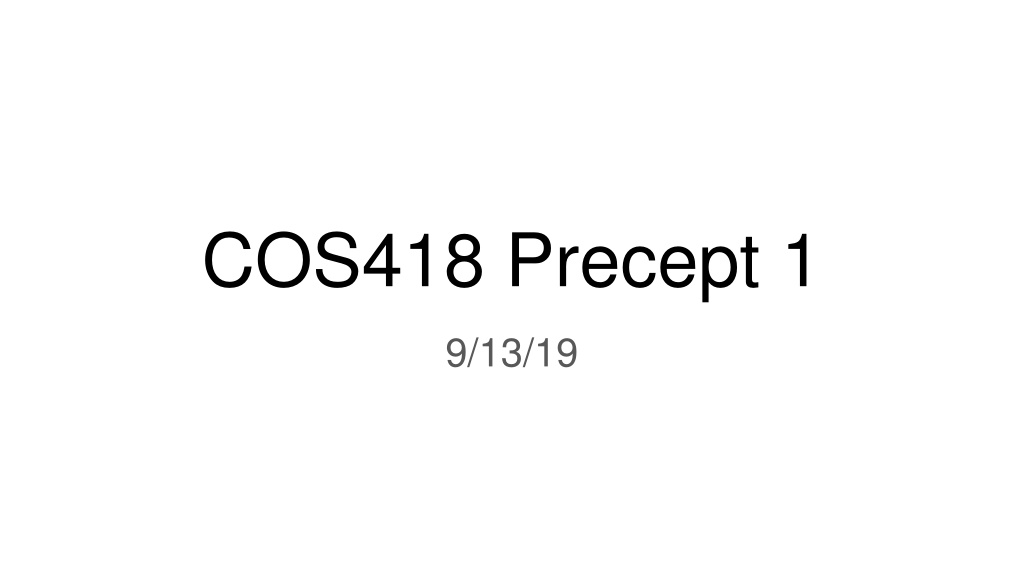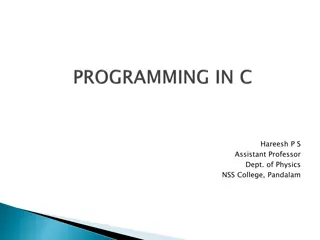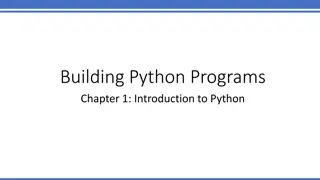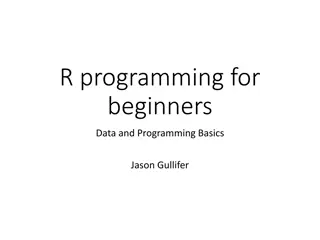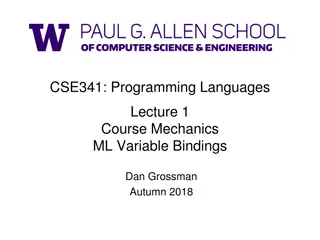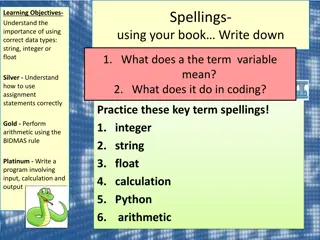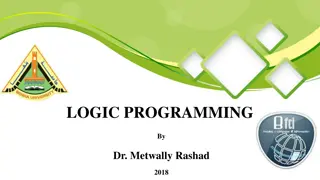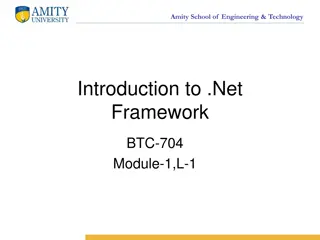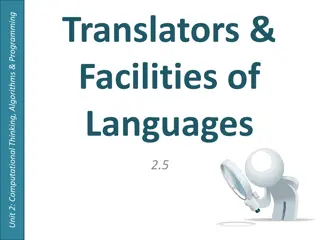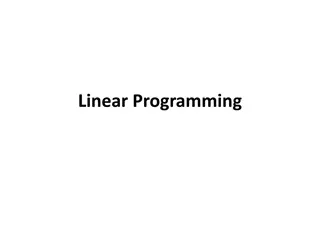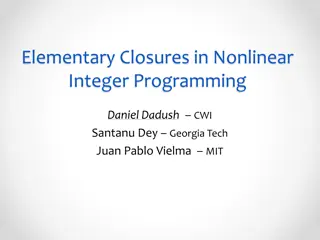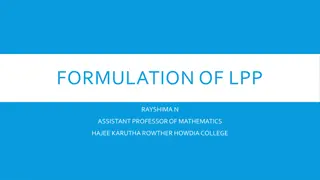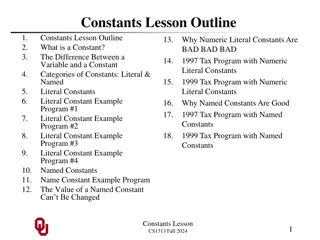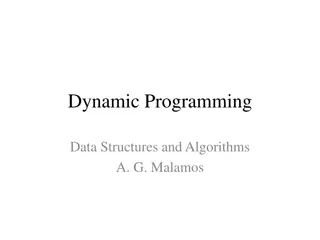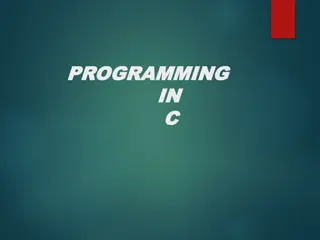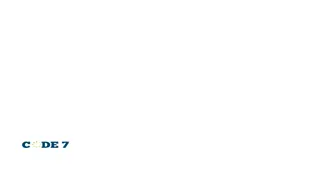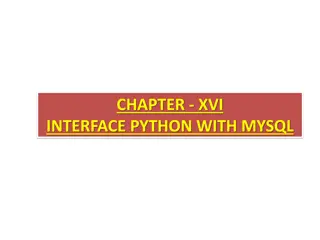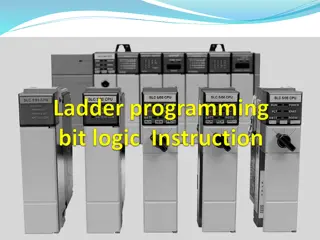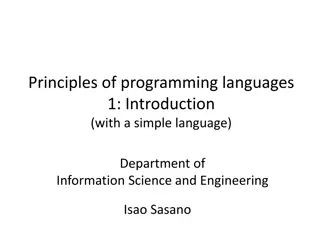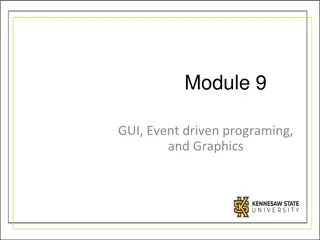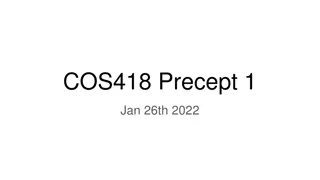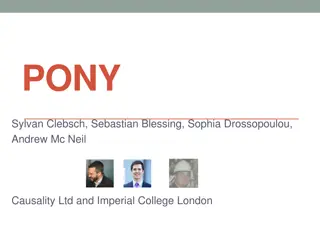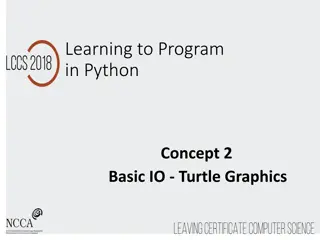Learning Go Programming Basics
Discover essential resources and syntax for Go programming, including package declarations, function declarations, loops, slices, and maps. Explore tutorials and code snippets to kickstart your journey into Go programming.
Download Presentation

Please find below an Image/Link to download the presentation.
The content on the website is provided AS IS for your information and personal use only. It may not be sold, licensed, or shared on other websites without obtaining consent from the author. Download presentation by click this link. If you encounter any issues during the download, it is possible that the publisher has removed the file from their server.
E N D
Presentation Transcript
COS418 Precept 1 9/13/19
Excellent resources: Go tutorial: https://tour.golang.org/list Hello World: https://play.golang.org
Basic syntax code in playground: https://tinyurl.com/y7rdgqj3
// All files start with a package declaration package main // Import statements, one package on each line import ( "errors" "fmt" ) // Main method will be called when the Go executable is run func main() { fmt.Println("Hello world!") basic() add(1, 2) divide(3, 4) loops() slices() maps() sharks() }
// Function declaration func basic() { // Declare x as a variable, initialized to 0 var x int // Declare y as a variable, initialized to 2 var y int = 2 // Declare z as a variable, initialized to 4 // This syntax can only be used in a function z := 4 // Assign values to variables x = 1 y = 2 z = x + 2 * y + 3 // Print the variables; just use %v for most types fmt.Printf("x = %v, y = %v, z = %v\n", x, y, z) }
// Function declaration; takes in 2 ints and outputs an int func add(x, y int) int { return x + y } // Function that returns two things; error is nil if successful func divide(x, y int) (float64, error) { if y == 0 { return 0.0, errors.New("Divide by zero") } // Cast x and y to float64 before dividing return float64(x) / float64(y), nil }
func loops() { // For loop for i := 0; i < 10; i++ { fmt.Print(".") } // While loop sum := 1 for sum < 1000 { sum *= 2 } fmt.Printf("The sum is %v\n", sum) }
func slices() { slice := []int{1, 2, 3, 4, 5, 6, 7, 8} fmt.Println(slice) fmt.Println(slice[2:5]) // 3, 4, 5 fmt.Println(slice[5:]) // 6, 7, 8 fmt.Println(slice[:3]) // 1, 2, 3 slice2 := make([]string, 3) slice2[0] = "tic" slice2[1] = "tac" slice2[2] = "toe" fmt.Println(slice2) slice2 = append(slice2, "tom") slice2 = append(slice2, "radar") fmt.Println(slice2) for index, value := range slice2 { fmt.Printf("%v: %v\n", index, value) } fmt.Printf("Slice length = %v\n", len(slice2)) }
func maps() { myMap := make(map[string]int) myMap["yellow"] = 1 myMap["magic"] = 2 myMap["amsterdam"] = 3 fmt.Println(myMap) myMap["magic"] = 100 delete(myMap, "amsterdam") fmt.Println(myMap) fmt.Printf("Map size = %v\n", len(myMap)) }
// Object oriented programming // Convention: capitalize first letter of public fields type Shark struct { Name string Age int } // Declare a public method // This is called a receiver method func (s *Shark) Bite() { fmt.Printf("%v says CHOMP!\n", s.Name) } // Because functions in Go are pass by value // (as opposed to pass by reference), receiver // methods generally take in pointers to the // object instead of the object itself. func (s *Shark) ChangeName(newName string) { s.Name = newName }
// Receiver methods can take in other objects as well func (s *Shark) Greet(s2 *Shark) { if (s.Age < s2.Age) { fmt.Printf("%v says your majesty\n", s.Name) } else { fmt.Printf("%v says yo what's up %v\n", s.Name, s2.Name) } } func sharks() { shark1 := Shark{"Bruce", 32} shark2 := Shark{"Sharkira", 40} shark1.Bite() shark1.ChangeName("Lee") shark1.Greet(&shark2) // pass in pointer shark2.Greet(&shark1) }
// Launch n goroutines, each printing a number // Note how the numbers are not printed in order func goroutines() { for i := 0; i < 10; i++ { // Print the number asynchronously go fmt.Printf("Printing %v in a goroutine\n", i) } // At this point the numbers may not have been printed yet fmt.Println("Launched the goroutines") }
// Channels are a way to pass messages across goroutines func channels() { ch := make(chan int) // Launch a goroutine using an anonymous function go func() { i := 1 for { // This line blocks until someone // consumes from the channel ch <- i * i i++ } }() // Extract first 10 squared numbers from the channel for i := 0; i < 10; i++ { // This line blocks until someone sends into the channel fmt.Printf("The next squared number is %v\n", <-ch) } }
// Buffered channels are like channels except: // 1. Sending only blocks when the channel is full // 2. Receiving only blocks when the channel is empty func bufferedChannels() { ch := make(chan int, 3) ch <- 1 ch <- 2 ch <- 3 // Buffer is now full; sending any new messages will block // Instead let's just consume from the channel for i := 0; i < 3; i++ { fmt.Printf("Consuming %v from channel\n", <-ch) } // Buffer is now empty; consuming from channel will block }
